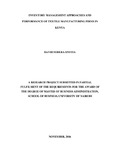| dc.description.abstract | Inventory management is a system concerned with integration of information, transportation, acquisition, inspection, material handling, warehousing, packaging and control of supplies and ensuring security of inventory. Inventory management aims at discovering and maintaining optimal levels of investment in all types of inventories and maximizing the flow of goods, information and other related resources like people and energy from the point of origin to the point of final consumption. The broad objective of this research was to establish the role of inventory management approaches on the performance of textile firms. Specifically, the study sought to establish the inventory management approaches used by textile firms in Kenya; to establish the level of effectiveness of inventory management approaches of Kenya’s textile firms and to determine the relationship between inventory management approaches and performance of textile firms in Kenya. A descriptive cross sectional design was used in this study to examine inventory management approaches in textile manufacturing firms in Kenya. The target population included all the 35 textile manufacturing firms in Kenya. This study utilized primary data. Data was obtained using questionnaires developed by the researcher. The questionnaire contains questions and statements based on the research objectives. Data was prepared for analysis through editing, coding and data entry. Data editing was done to ensure data was accurate and consistent with the research questions and objectives. Data was analyzed using Statistical Package for Social Sciences (SPSS) programs and presented in form of tables to give representation of research findings and for ease of interpretation. Means and standard deviations were used to show the extent to which textile firms have adopted inventory management approaches and regression analysis was used to explain the relationships between inventory management and firm performance. The final report was then compiled after subjecting data through thorough analysis. The study established that manufacturing companies use information technology, lean inventory system and strategic supplier partnership as inventory management approaches. The study also concludes that there was a strong positive correlation between the inventory management practices and operational performance of the textile manufacturing firms. Finally, the the study found out that the inventory management approaches were effective with an average mean of 4.48 and a standard deviation of 0.453. The researcher recommends that the manufacturing companies should develop a policy framework to facilitate faster implementation of the best inventory management practices such as JIT and MRP. It is also recommended that such firms should consider investing in modern technology and implement EDI. This will reduce inventory costs and improve returns. Finally, the firms should also strengthen the supplier relation to the level of partnerships. This will facilitate implementation of programs such as Vendor Managed Inventory (VMI). | en_US |



